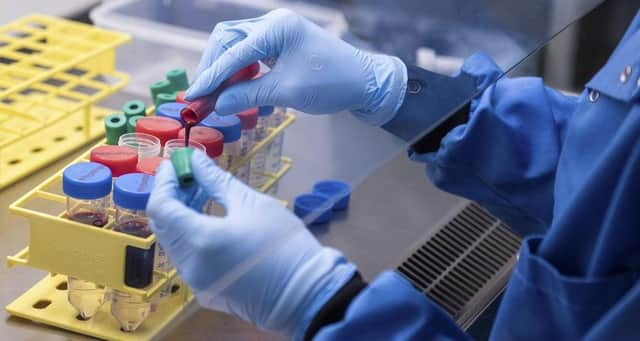Coronovirus in Scotland: What the real experts said about the Pfizer vaccine 'breakthrough'


Leading scientists gave their reaction.
Dr Albert Bourla, Pfizer chairman and chief executive, said: “Today is a great day for science and humanity.”
“The first set of results from our Phase three Covid-19 vaccine trial provides the initial evidence of our vaccine’s ability to prevent Covid-19.”
Advertisement
Hide AdAdvertisement
Hide AdHe added: “We will continue to collect further data as the trial continues to enrol, for a final analysis planned when a total of 164 confirmed Covid-19 cases have accrued.
“I would like to thank everyone who has contributed to make this important achievement possible.”
Ian Jones, professor of virology at the University of Reading, said the Pfizer trial data shows “really impressive protection and no reported adverse events”.
He said: “Of all the current vaccines currently in development, the BioNtech product always looked like the most bang-per-buck as it is entirely focused on the part of the virus that binds to the human cell, the receptor binding domain.
“The questions around its use were about the ability to manufacture at scale and the possible toxicity associated with a directly injected RNA product.
“The trial data show excellent results in both of those areas, really impressive protection and no reported adverse events.”
Dr Michael Head, senior research fellow in global health, University of Southampton, said: “This cautiously sounds like an excellent result from the phase three trials, but we should remain a little cautious.
“If the final results show an effectiveness of anywhere near 90% with response in elderly and ethnic minority populations, that is an excellent result for a first generation vaccine.”
Advertisement
Hide AdAdvertisement
Hide AdProfessor Azra Ghani, chair of infectious disease epidemiology at Imperial College London, said that long-term efficacy data would come over coming weeks and months.
Prof Ghani said: “These new results represent the first demonstration of substantial efficacy of a vaccine candidate against Covid-19 disease, which is very welcome news.
“The efficacy estimate is based on seven days of follow-up of participants following the second dose; further data in the coming weeks and months will provide a better picture of longer-term vaccine efficacy.”
Peter Horby, professor of emerging infectious diseases and global health in the Nuffield Department of Medicine at the University of Oxford, said the Pfizer results “bode well for Covid vaccines in general”.
“This news made me smile from ear to ear,” said the scientist.
“It is a relief to see such positive results on this vaccine and bodes well for Covid-19 vaccines in general.
“Of course we need to see more detail and await the final results, and there is a long long way to go before vaccines will start to make a real difference, but this feels to me like a watershed moment.”
Sir John Bell, regius professor of medicine at Oxford University and a member of the Government’s vaccine taskforce, said that other vaccines were now likely to become available in the near future.
Advertisement
Hide AdAdvertisement
Hide Ad“I am really delighted with this result – it shows that you can make a vaccine against this little critter. Ninety percent is an amazing level of efficacy,” he told BBC Radio 4’s The World at One.
“It rolls the pitch for other vaccines because I can’t see any reason now why we shouldn’t have a handful of good vaccines.”
Asked if people could look forward to a return to normal life by the spring, Sir John replied: “Yes, yes, yes, yes. I am probably the first guy to say that but I will say that with some confidence.”